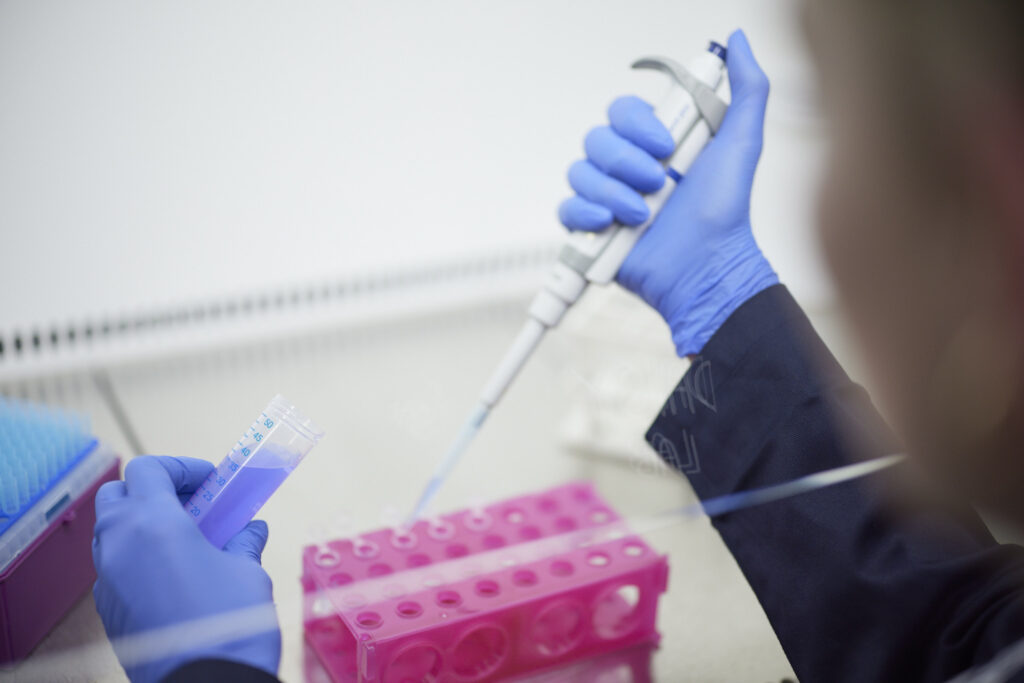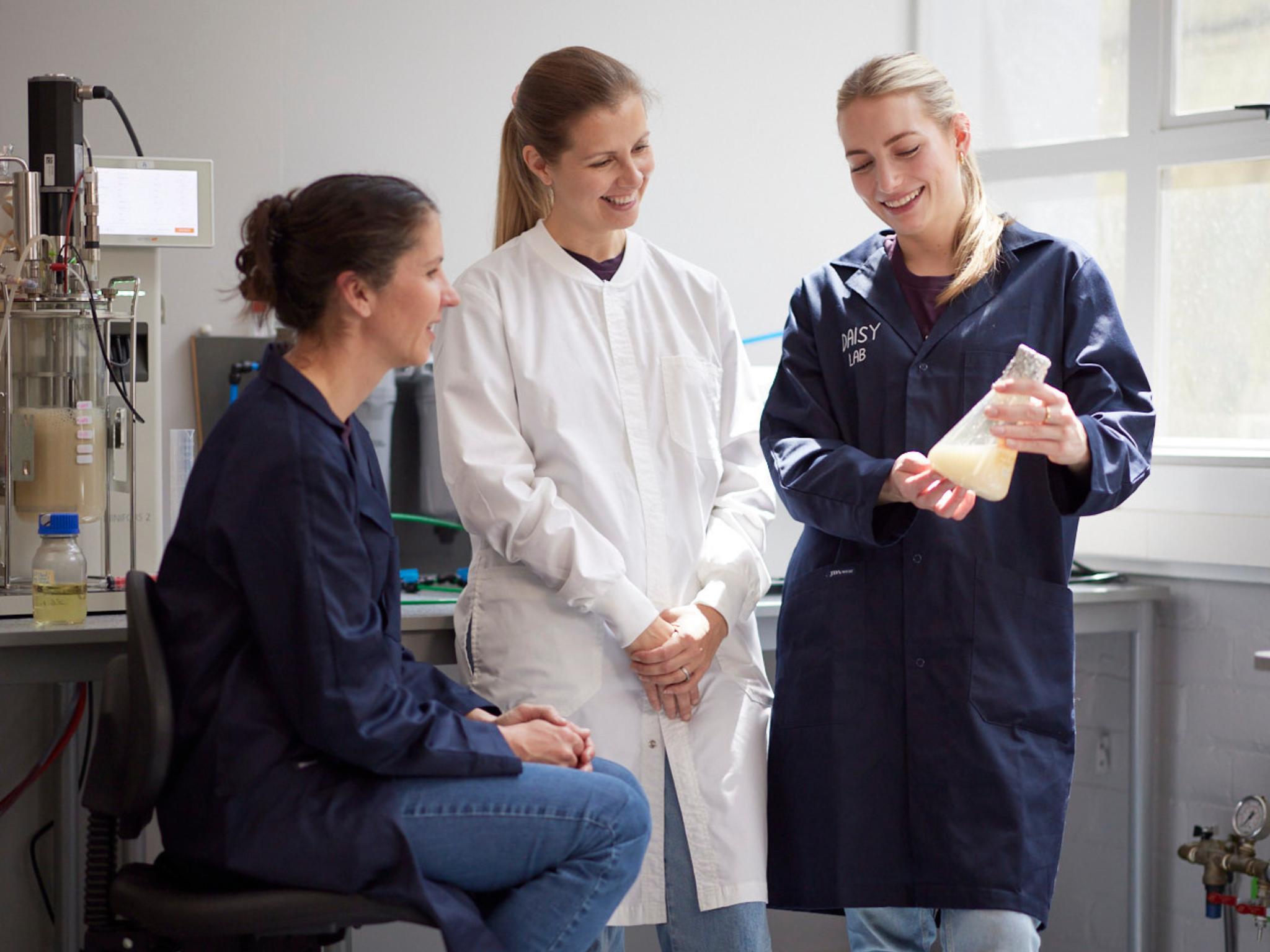This NZ Startup’s Animal-Free Bovine Lactoferrin Has A Higher Yield Than Cow’s Milk
4 Mins Read
Auckland-based food tech startup Daisy Lab has achieved a high-yielding recombinant bovine lactoferrin that surpasses the protein’s concentration in cow’s milk.
Daisy Lab, a precision fermentation startup making cow-free whey proteins, has produced bovine lactoferrin that outperforms its conventional counterpart.
Found in bovine colostrum, lactoferrin occurs in cow’s milk at concentrations as low as 0.02g to 0.2g per litre, but the New Zealand startup has achieved a yield higher by “more than an order of magnitude”, producing multiple grams of the protein in a yeast host instead.
It will allow dairy producers to use lactoferrin at low inclusion rates in a cost-efficient manner, presenting an alternative for what is traditionally a highly expensive protein.
“When scaled, the cost to produce our lactoferrin is likely to be about 10 times lower than the commodity price of lactoferrin,” Daisy Lab co-founder and CEO Irina Miller tells Green Queen. “As we continue to scale up and refine our fermentation processes, the cost of producing our lactoferrin will come down.”
Daisy Lab aims to enable – not disrupt – the dairy industry

Lactoferrin is an in-demand protein due to its many functional benefits, including antiviral, antibacterial, anti-carcinogenic, immunity-boosting, gut-strengthening and iron regulation properties.
But it’s in short supply, since it can take 10,000 litres of milk to produce just 1kg of purified lactoferrin, which currently retails for $750-$1,500 per kg and is restricted to essential applications like infant formula and supplements.
Precision fermentation – which combines traditional fermentation with the latest biotech advancements to produce compounds of interest – can solve the production bottleneck as it eschews the need for cow’s milk altogether. While it remains an expensive technology, the high costs of conventional lactoferrin make it attractive nonetheless, and even more so if startups like Daisy Lab can meet their cost projections.
“Industrial purification will be the next biggest challenge, but geographically, we are best positioned to solve it,” says Miller. While Daisy Lab has not revealed exact details about the yield, the CEO notes that the breakthrough “has a very viable potential to disrupt the existing bovine lactoferrin market”.
“New Zealand dairy companies are producing large volumes of lactoferrin that is traded on the market today,” she points out, outlining the company’s wish to be an “enabler” rather than a “disruptor” of the dairy industry.
“We are in talks with dairy companies who are interested in the potential of our technology. Our model is to enable existing dairy operators to produce precision fermentation proteins, and we see ourselves integrating into their already existing state-of-the-art protein processing knowledge,” says Miller.
“We have partnered with a third-party strain provider and are currently producing lactoferrin in our lab in Auckland,” she adds.
Why Daisy Lab diversified into lactoferrin

Lactoferrin isn’t the only whey protein under development at Daisy Lab – it’s not even the first. The company has been working on beta-lactoglobulin (the dominant whey protein found in dairy), which has gelling, foaming and emulsification properties that enhance mouthfeel and texture in food and drink applications.
Whey protein is the target of several precision fermentation companies, including FDA-approved Perfect Day, Remilk, Imagindairy, and Vivici. France’s Verley and Denmark’s 21st.Bio have both self-affirmed their ingredients’ Generally Recognized as Safe (GRAS) status, and notified the FDA of its ‘no questions’ letter too.
Daisy Lab says its regulatory plans would “largely depend on where our potential partners are based globally”. It has scaled up its beta-lactoglobulin production to 10g per litre, and will begin fundraising in the coming months to build a 1,000-litre demo facility.
“We are gearing up for the arrival of a larger fermenter later this year. This will allow us to demonstrate our technology at scale to our future customers,” says Miller.
Having already raised NZ$1.75M ($1.08M), it only pivoted to lactoferrin in early 2024, reflective of a wider trend in the precision fermentation protein industry. “Due to some reported headwinds in the alternative proteins’ investment market, we felt that we needed to bolster our commercial strategy,” Miller explained at the time.
“It is a very high-value ingredient, and it is rational to be chasing it to prove the commercial viability of your technology,” she says now. “Having high-producing strains is only part of the picture. Scaling up the fermentation and downstream processing – as well as ensuring the strains retain the functionality of their natural counterparts – are the next very important challenges to tackle.’
Vivici recently also diversified into recombinant lactoferrin production, joining several other precision fermentation startups working on either bovine or human lactoferrin. This includes Australia’s Noumi, New Zealand’s Daisy Lab, and US firms Helaina, De Novo Foodlabs and Triplebar. So far, though, only Singapore’s TurtleTree and Sydney-based All G Foods have been cleared to sell animal-free lactoferrin in the US.



